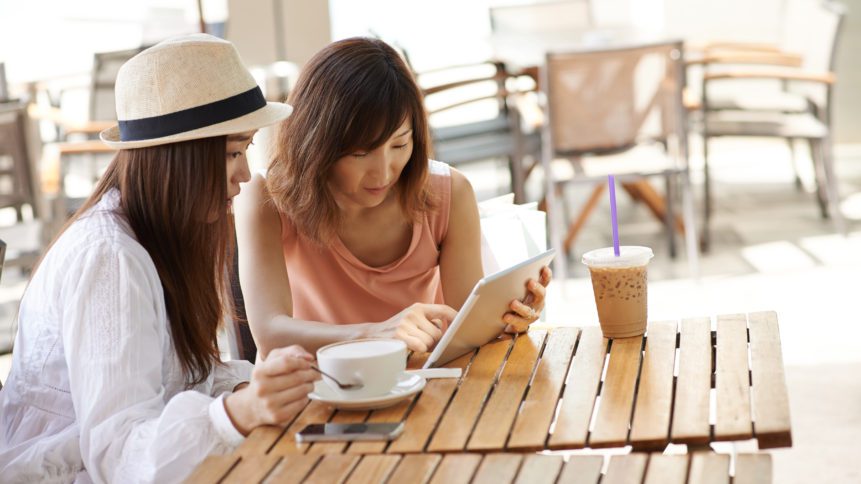
“You’re so brave!”
When I told people this year that I was freezing my eggs and was also openly sharing my journey, they called me “brave.” Were they applauding my decision to freeze my eggs or to talk about it? Maybe it was both.
I didn’t have to freeze my eggs but I had felt like it had become unavoidable. I first started to explore the idea two years ago, when I was 30 and had my gynecologist test my fertility blood levels. I was OK.
Again last year, I got another test to see if anything had changed. My gynecologist still said I didn’t have to worry. I still had good levels and a very regular period. But something within me eventually pushed me to a consultation at an egg freezing service. I was in a relationship with a man who already had kids and probably didn’t want more, and I became highly aware that my biological clock continued to tick and tock and could eventually turn against me.
Even though I was still fertile at the moment, and despite having spiritual qualms about egg freezing and concerns over side effects, it quickly turned into something I thought I had to do to preserve my chances of becoming a mom.
Then once I decided to undergo the procedure, I felt the need to be honest and open about it. That was arguably the scarier part—not just facing possible medical complications, but being emotionally vulnerable.
As a personal essayist, I am open about the rest of my life, but this was super personal. I would be acknowledging that despite my typical boldness, I was getting older, that I had limitations as a 32-year-old woman, and I would have no idea what would happen.
To prepare myself, I started searching online for guidance. I always find knowledge to be empowering, even if it sometimes stings at first. The more I learned, the more I wanted to do it. I then figured disseminating my thoughts and research to people in my circle and in an open forum— on social media—could possibly help others. Why should I hoard my notes?
I felt like I became a better, sensitive, more hopeful version of myself up to the retrieval and then…a bloated, crampier version of myself.
People start online sisterhoods, book-club like friendships, and group chats on everything — mental health, sobriety, and, of course, fertility struggles. It made sense for me to share this aspect of my life, too.
I was iffy about injecting myself every day for a week-plus, but my cousin stayed with me and served as a distraction. I tried to continue with my life, though I had to postpone exercising and couldn’t travel because of on-site monitoring. After egg retrieval, I took a day off from work but I was surprised that my body took a while to bounce back.
Throughout this whole process, I learned about myself, largely through conversations with people I shared my story with. And I was pretty open with everyone:
1. Early in the process, I ran the egg freezing idea by my mom. She was surprisingly very supportive, even if she couldn’t quite understand what exactly would be happening (how do you explain injecting yourself with hormones in Korean?). In a role reversal, I didn’t want her to worry. Funny, though, that she was actually most concerned about my potential weight gain! This made me comfortable, though, to talk with her later when I was bloated, and she could advise me.
2. After my initial ultrasound and blood tests, I posted about it in a Facebook mom’s group. It was about a month before I started, and I asked for advice on maintaining a fertility diet. I had decided to plan ahead and prepare as if I were pregnant. I wanted to maintain a healthy body to encourage presumably healthy eggs that could produce presumably healthy babies in the future. New mothers and hopeful mothers recommended good books, then I went to a nutritionist for a more professional consultation.
3. I told my girlfriends, sometimes one by one and in person. I needed someone to keep me sane on the way to the procedure and another to escort me from the hospital after anesthesia. Many offered. One close friend made a pact with me to also undergo egg freezing around the same time. Sharing my experience helped demystify the process for my friends. Several were encouraged to check out their own blood levels to and start thinking about this option. I kept them abreast of my timeline, and my best friend sent me flowers and “thinking of you” messages. It’s great to have a nonjudgmental support system no matter what you are going through.
4. I told my guy friends. I thought it might be awkward, but it turned out that my closest male buddies are older, and they already had friends who had gone through the process. They made it easy to talk to them about this. The dudes might not have ovaries, but they have hearts.
5. I told the new guys I was dating. I was very up front with what I envisioned for my life, and they could politely see their way out if our visions didn’t align. (My now-ex was not supportive overall, but I did not do this as a reaction to our breakup.)
The first guy I mentioned it to responded sweetly: “You’ll make a great mom.” (It didn’t work out with him, but I’ll always remember this moment fondly.) Another guy distracted me while I injected myself with hormones and even offered to meet me before my retrieval that morning when my other friends could not make it. By telling him who I was at the time, I gave him a chance to respond and show me who he was. I still am so grateful that he walked me up the stairs, as I was feeling particularly anxious that morning. This reinforced to me that we shouldn’t be afraid to be ourselves and to voice what we want.
6. I told my yoga students. I didn’t want to distract them, but I did want to be clear about why I would not be demonstrating twists. It was also an opportunity for practitioners to get to know me on a deeper level. One of them whispered to me that she had done it, too, like we were in a secret club. We had a special bonding moment.
7. I told my coworkers. I did this partly because our work insurance covered most of the doctor’s visits and procedures and I thought others could take advantage of it. The cost is significant but doesn’t have to be a hindrance. People wouldn’t hide that there was free pizza in the break room, right? This was more serious, but it was all about looking out for your people.
I also gave a heads up to my direct boss and colleagues as there was an honest reason I couldn’t travel on projects that month: I had to be monitored almost every other day. Additionally, I wanted to find a way to interact differently; I sent a group email to outside team members to say that I’d love to go for a walk over lunch or a coffee break for shop talk. People found it memorable and engaging.
8. I told my new therapist, recommended by the fertility center. We didn’t end up talking much about my egg-freezing worries. Instead, we managed my general stress level, discussing larger issues and concerns.
9. I told insta-friends and insta-strangers by starting a new, public Instagram account called @theeggidiary. I posted a short vlog every day. I didn’t do it to fish for compliments. My mini unscripted monologues were to keep it real and serve as a journal as well as a source. A virtual friend saw the account and interviewed me for her podcast to dive into it more. I got plenty of other heartfelt messages on the not-so-great days from people I would not know or have heard from otherwise:
“Just wanted to let you know I really value this page because it might be one of the only ways I can have my own child, and this gets me through the process.”
“Thank you for sharing your journey. I start my medication tomorrow…and seeing you still going out gives me hope it won’t be too bad.”
Some of my friends helped me stay positive:
“All the love and good thoughts, my friend! Here’s to technology and taking advantage of it for going after our biggest desires!”
“I’ve been following your journey and am about to embark on my own. YOU GOT THIS!”
Everyone who follows my Instagram account eventually found out that I froze 11 eggs, I was quite hormonal post-retrieval, I’m considering doing another round, and that I would like to have a baby sooner rather than later, and preferably with a partner I know and love. I kept up the diary occasionally afterward; I didn’t realize that the weeks after the retrieval would be more daunting and physically uncomfortable. I also thought it was important to share that although my results were solid, they were not perfect (my doctor said we could have had more to work with in the future).
I felt like I became a better, sensitive, more hopeful version of myself up to the retrieval and then…a bloated, crampier version of myself. Everyone got to see different sides of me, including me. I’ve grown as a more honest, vulnerable, and stronger person.
I’m happy that I decided to break free of “normal” conventions and was open about my egg freezing. I needed an outlet, some way to feel like what I was doing was a valid, human experience. Although egg freezing is an extremely personal journey, sharing my experience, on social media and off helped me realize that it can be a new, modern “normal.”
Sometimes you keep things to yourself because you don’t want to jinx it, or it seems easier. I didn’t know if things were going to go well. I’m glad that I found out that I would end up OK because I had loved ones caring about and for me through the ups, downs, and in-betweens.
You should feel comfortable with however you decide to handle your own very personal situations—sharing about it or not. But sharing with at least one other person reminds us that we are never completely alone.
Contributor
Ko Im
Ko Im is personal essayist and the author of Broke, not Broken. She serves as Deputy Editor of NY Yoga + Life Magazine, teaches yoga and meditation in New York City, and leads wellness retreats around the world. She was a former on-camera correspondent for CBS News, and has written for Cosmopolitan, Glamour, The Washington Post and USA Today. You can follow her blog: konakafe.com and Instagram: @konakafe.

Listen to stories, share your own, and get feedback from the community.


















